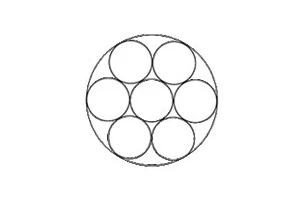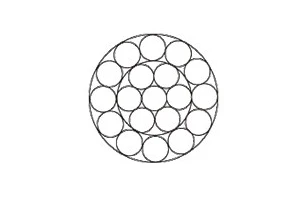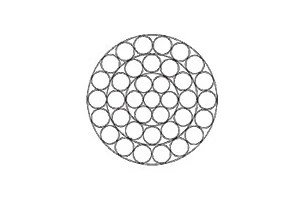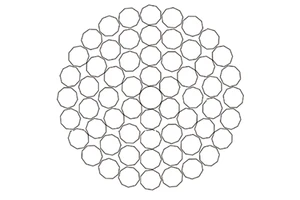Why is non-rotating rope also called multi-strand rope?
I. Why Is It Called "Multi-Strand" Non-Rotating Rope?
Non-rotating wire rope, also known as multi-strand rope or anti-twist rope, derives its name from its unique layered structure. It is constructed with multiple strands twisted in alternating directions, effectively neutralizing rotational torque during load-bearing applications. For example:
- 18×7 structure: Three right-twisted layers (outer: 12 strands at 0.25D, middle: 6 strands at 0.18D, core: 1 strand at 0.12D).
- 35W×7 structure: Four right-twisted layers (outer: 18 strands at 0.22D, third layer: 12 strands at 0.16D, second layer: 5 strands at 0.11D, core: 1 strand at 0.07D).
Per GB/T 20118-2017 (China’s wire rope technical standard), this "concentric layer" design creates a torque-balancing system, reducing rotation by 60-80% compared to conventional ropes.
II. How Does It Resist Rotation?
- Twist Direction & Pitch: Alternating twist directions (typically lang lay) and calibrated strand pitches ensure net torque approaches zero.
- Breaking Force Efficiency:
- Standard ropes: 0.82–0.85
- Non-rotating ropes: 0.90–0.93 (GB/T 8918-2020).
- Service Life Comparison:
| Application | Standard Rope (hrs) | Non-Rotating Rope (hrs) |
|---|---|---|
| Port lifting | 800–1,200 | 1,800–2,500 |
| Mine hoisting | 1,500–2,000 | 3,000–4,000 |
| Data: China National Institute for Metal Products (2023) |
III. Key Applications
- Construction Machinery: Tower cranes (prevents load sway), mobile cranes (enhances stability), bridge girder erection (ensures precision).
- Marine Engineering: Offshore platforms (resists wave torque), submersible deployment (maintains vertical entry).
- Special Equipment: Cable cars (eliminates cabin rotation), elevator compensation chains (improves smoothness).
IV. Selection Guidelines
- Safety Factor: ≥5 (6–8 for heavy-duty use) per GB/T 3811-2008.
- Specifications:
- Diameter tolerance: ±1–2% (GB/T 8918).
- Non-rotation index: ≤2°/100d (industry standard).
- Surface Treatment:
| Environment | Coating Type | Zinc Coating (g/m²) |
|---|---|---|
| General atmosphere | Type B galvanized | 90–120 |
| Marine | Type AB galvanized | 200–300 |
| Severe corrosion | 316 stainless steel | – |
- Installation:
- Pre-tension: 10–15% of breaking force.
- Rotation check: <5°/m when unloaded.
V. Future Trends: AI-Enhanced Smart Ropes
At the 2024 Munich Bauma Construction Expo, next-gen smart ropes debuted with:
- Real-time monitoring: Tension, torque, and wear detection.
- AI lifespan prediction: ±3% accuracy.
- Self-lubrication: Nano-capsule release technology (ASTM D4875 compliant).
This innovation marks the shift toward intelligent load-management systems in heavy industries.





